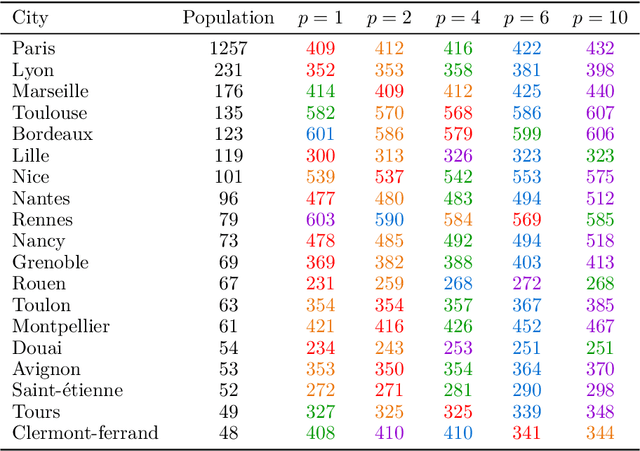Sirin Botan
Fair Railway Network Design
Sep 03, 2024



Abstract:When designing a public transportation network in a country, one may want to minimise the sum of travel duration of all inhabitants. This corresponds to a purely utilitarian view and does not involve any fairness consideration, as the resulting network will typically benefit the capital city and/or large central cities while leaving some peripheral cities behind. On the other hand, a more egalitarian view will allow some people to travel between peripheral cities without having to go through a central city. We define a model, propose algorithms for computing solution networks, and report on experiments based on real data.
Let's Agree to Agree: Targeting Consensus for Incomplete Preferences through Majority Dynamics
Apr 28, 2022



Abstract:We study settings in which agents with incomplete preferences need to make a collective decision. We focus on a process of majority dynamics where issues are addressed one at a time and undecided agents follow the opinion of the majority. We assess the effects of this process on various consensus notions -- such as the Condorcet winner -- and show that in the worst case, myopic adherence to the majority damages existing consensus; yet, simulation experiments indicate that the damage is often mild. We also examine scenarios where the chair of the decision process can control the existence (or the identity) of consensus, by determining the order in which the issues are discussed.
Egalitarian Judgment Aggregation
Feb 04, 2021


Abstract:Egalitarian considerations play a central role in many areas of social choice theory. Applications of egalitarian principles range from ensuring everyone gets an equal share of a cake when deciding how to divide it, to guaranteeing balance with respect to gender or ethnicity in committee elections. Yet, the egalitarian approach has received little attention in judgment aggregation -- a powerful framework for aggregating logically interconnected issues. We make the first steps towards filling that gap. We introduce axioms capturing two classical interpretations of egalitarianism in judgment aggregation and situate these within the context of existing axioms in the pertinent framework of belief merging. We then explore the relationship between these axioms and several notions of strategyproofness from social choice theory at large. Finally, a novel egalitarian judgment aggregation rule stems from our analysis; we present complexity results concerning both outcome determination and strategic manipulation for that rule.
 Add to Chrome
Add to Chrome Add to Firefox
Add to Firefox Add to Edge
Add to Edge